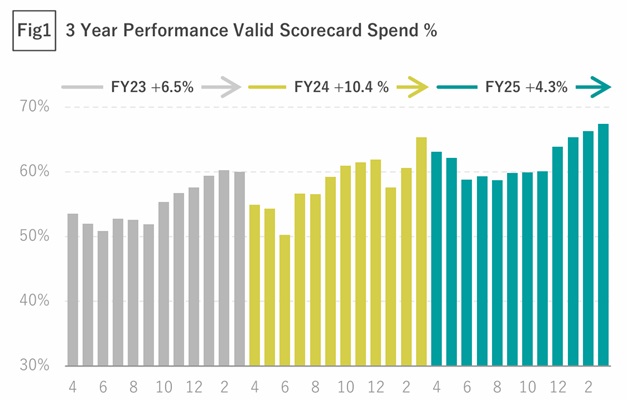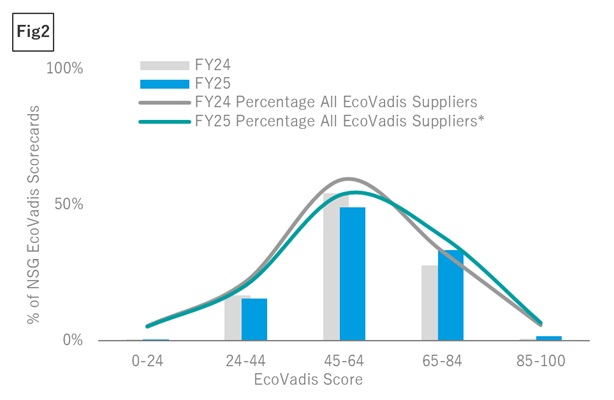Sustainable Supply Chains
NSG's commitment
NSG Group aspires to use its significant economic influence to improve standards and reduce carbon emissions across its extensive supply chain for the benefit of the planet and society. This is in support of NSG Group's vision of "Changing our Surroundings, improving our World".
Supplier Development
The NSG Group monitors its suppliers' ESG rating indicators (KPIs) through EcoVadis (an external organization that assesses supply chain ESG performance) to continuously improve the sustainability of its supply chain. The EcoVadis rating coverage of our key suppliers (based on weighted average purchase value) has steadily increased over the past three years, as shown in Figure 1: We increased spend coverage to 67.4% versus our FY2025/3 MTP target of 68% in FY2025/3. We continued to focus on suppliers with low EcoVadis scores and worked towards improving their scores through corrective action plans. As shown in Figure 2, the overall average score was maintained at target level of 60. The number of low-scoring suppliers decreased and at the same time we increased the number of suppliers assessed by EcoVadis assessment with 1,341 (+30%).


Figure 3 shows the scores by category for the key EcoVadis themes: environment (ENV), labor and human rights (LHR), ethics (ETH) and sustainable sourcing (SUS). Our consistent focus is delivering positive trends in all themes. EcoVadis spend coverage plus average score is a KPI in our 1st Sustainability Linked Loan in UK. CY24 performance has been externally verified by recognized by 3rd party UK based auditors.
Supplier Quality & Environmental Compliance
Special attention is paid to suppliers with a potentially significant impact on the environment (HEI: High Environmental Impact). Suppliers in the HEI categories such as wood packaging, chemicals, etc. are required to sign and comply with a Supplier Code of Conduct, obtain ISO 14001 or equivalent national environmental certification and/or EcoVadis assessment. Also, for wood, paper and corrugated packaging materials we strive to minimize the negative environmental impact of these suppliers by requiring them to obtain Chain of Custody (CoC) certification from the Forest Stewardship Council (FSC) or PEFC forest certification programs for their raw material suppliers, for example. Supplier compliance status in terms of environmental aspects, such as ISO 14001, forest certification and EcoVadis scores, and in terms of quality, such as IATF 16949 and ISO 9001, is shown in Figure 4.
Strategic Approach to Sustainable Supply Chains
In 2022 NSG established a new Procurement mission fully aligned with the Group's mission "Changing our Surroundings, Improving our World". The Procurement mission "Leveraging our Supply Chains, improving our World" recognizes the vital contribution that our supply partners can make to the planet and society and also to NSG's own goals in the area of Sustainability. This section of our Integrated Report will set out NSG's ambitions in this area and provide some examples of the initiatives we are working on in partnership with our suppliers.
We will:
- Align the supply chain sustainability strategy with the NSG Group's sustainability objectives
- Ensure that NSG is recognized as a leader in sustainability in the supply chain
- Assist in attracting and retaining diverse talent
- Follow international standard, ISO 20400: Principles of sustainable procurement.
As a first step, we have published in September 2023 a Supply Chain Charter outlining our long term aspirations and commitments as part of establishing and developing a fully sustainable Supply Chain. The Supply Chain Charter will also list the corresponding commitments expected of our suppliers and the KPIs we will use to measure their progress. As a second step in 2024 we have rolled out the Charter with our key Partners and we will promote it further within our supply base as a key instrument to increase resilience and reduce risk.
The Supply Chain Charter identified the following eight key sustainability impact themes as having the greatest impact on the supply chain.
Sustainability prioritization heat maps
We strive to improve the sustainability performance of our supply chain in these eight priority areas. However, all our suppliers are impacting social and environmental values differently, depending on the materials or services they supply, their operational activities, and their geographical location.
To help us prioritize our Charter efforts most effectively, we created risk prioritization heat maps embedded in The Charter.
The heat maps will give us confidence that we are focusing our efforts for the greatest positive impact on our shared goals.
Figure 6 illustrate our use of heatmap prioritization to assess and monitor risks related to Labor and Human Rights (L&HR) across our procurement categories.
The Heat map identifies the categories risk level, with red indicating high-risk areas that require closer scrutiny.
To address these risks, we utilize tools such as EcoVadis reporting platform to conduct in-depth assessments of suppliers within high-risk categories. In heatmap example Fig 6.1, the categories circled in black are related to "Technical Glass business (Creative Technology)" high risk for L&HR.
Figure 7.1 shows 84% of supplier spend in this "Technical Glass business" category is covered with EcoVadis assessment, a significant achievement that reflects our commitment to responsible sourcing. Furthermore, Figure 7.2 highlights a 26% improvement in supplier L&HR scores within this category over the 12 months. This positive trend highlights the effectiveness of our risk-based approach and the impact of targeted supplier engagement and improvement initiatives.
ESG targets and training
NSG's Procurement Team, from Executive Directors through all levels, have S.M.A.R.T objectives (Specific, Measurable, Achievable, Realistic, Timely) related to the sustainability activities described above. They are also required to attend various training courses on ESG items such as NSG Code of Ethics, Anti-Bribery and Anti-Corruption (ABAC), Competition Compliance and, more recently, Fraud and IS Security. In addition, with the support of our long-term partner EcoVadis, we are conducting formal ESG awareness training sessions, including practical assistance on platform functions.
For each theme, we have set four key elements: commitment; expectations of suppliers; joint aspirations, (which is what we and our suppliers aim to achieve together) and KPIs to measure and track progress. We also conduct risk heatmap analysis to establish priority themes by procurement category and region.
In parallel we are accelerating our efforts to reduce our Scope 3 carbon emissions in line with the publicly announced 30% target as shown in Figure 8. The maturity of Procurement ESG objectives is illustrated in Figure 8. This activity has a strong cross functional governance in place, reporting directly into the Group's overall Sustainability Committee, chaired by the CEO.
External evaluation in FY2025/3
We are very pleased to announce that as in FY2025/3 we were again recognized that our efforts in working with our suppliers to improve in areas of ESG have been endorsed by an external assessment. We have been recognized by CDP in their most recent evaluation for CY2024 as a Leader in Supplier Engagement. This places us among the top 500 companies worldwide (out of a total of more than 13,000+ companies assessed), including 105 from Japan.
CDP is a non-profit organization that manages a global disclosure system for investors, companies, cities, states and regions to manage their environmental impact on climate change, water security and deforestation.
We use EcoVadis to cover and assess not only our procurement base, but also the requirements of our customers and investors. On the theme of 'sustainable procurement', we have managed to improve our score from 70 to 80 out of 100 points. This places us in the top 3% of the glass industry.
NSG Group has also taken the step in FY2023/3 to join the League of Champions within the Sustainable Procurement Pledge (SPP) organization. This network of individuals and companies is driving the agenda on Sustainable Procurement and Supply Chains. NSG is proud to join this group to help drive the program for Sustainable Procurement forward with even greater speed. In 2023 NSG contributed important materials for the SPP "Guide" document which supports organizations to improve on their ESG agenda and targets. In 2024 NSG actively participated to a pilot group on Carbon pricing with the aim to define the correct methodology to include sustainability in our sourcing decision process.